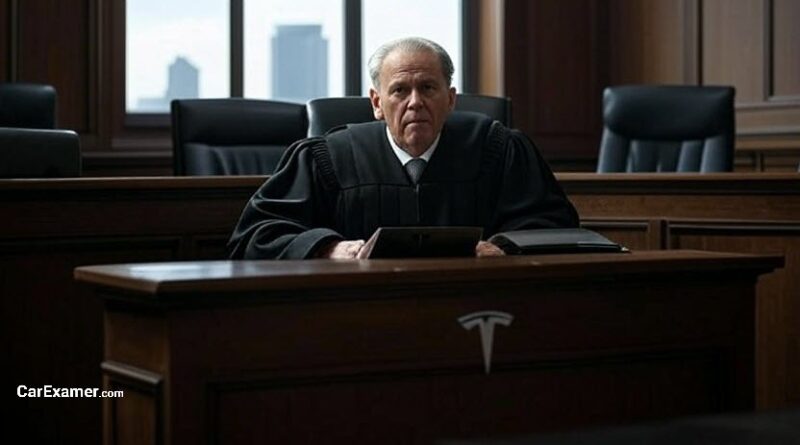Autopilot Verdict Against Tesla a Threatening Robotaxi Plans
Tesla’s ambitious plan to launch a nationwide robotaxi service has suffered a significant setback following a recent court verdict. A federal jury in Florida found Tesla partially responsible for a fatal crash involving its Autopilot technology, casting doubt on the safety and reliability of its automated driving systems. Below, we examine the details of the verdict, its implications for Tesla’s future, and how it might impact Elon Musk’s long-promised robotaxi ambitions. Let’s have a look Key Facts of the Autopilot Verdict Against Tesla:
Jury Decision and Damages
A jury recently ruled that Tesla was 33% responsible for a fatal accident involving a Model S in Key Largo, Florida, in 2019. The crash resulted in the death of Naibel Benavides Leon. Although the driver admitted to speeding and inattentiveness, jurors determined Tesla’s Autopilot system was defective and misleading in its advertised capabilities.
The court ordered Tesla to pay approximately $243 million in damages. This figure includes around $200 million in punitive damages intended as a deterrent against future negligence by companies developing similar technologies.
Tesla has publicly disagreed with the ruling and announced it intends to appeal, asserting that the driver’s negligence, rather than Autopilot, was responsible for the accident.
Implications for Tesla’s Robotaxi Vision
Trust and Regulatory Challenges
The verdict comes at a critical moment for Tesla, as it expands pilot tests of its robotaxi service in Austin, Texas. Tesla plans to launch fully autonomous ride-sharing services in multiple U.S. markets by 2025. However, this recent court decision raises serious questions about the safety and reliability of Tesla’s driver-assist technologies, potentially complicating regulatory approvals.
Experts warn the ruling could lead regulators in key states such as California, Nevada, Florida, and Arizona to reconsider granting Tesla permission for widespread autonomous vehicle testing and deployment. The loss of trust among the public and regulators may delay Tesla’s robotaxi ambitions significantly.
Potential Impact on Autonomous Vehicle Industry
This case may have broader implications for other automakers developing autonomous driving technologies. Legal analysts predict an increase in lawsuits against companies that market advanced driver-assistance systems (ADAS) if safety standards aren’t clearly met. As a result, automakers may face increased scrutiny and legal risks associated with deploying semi-autonomous or fully autonomous systems.
Stock Market and Investor Reaction
Following the jury’s verdict, Tesla’s stock price experienced noticeable volatility. Shares declined around 1.8% immediately following the ruling and dropped approximately 4% during the subsequent trading week. Investors are concerned that this verdict could signal ongoing risks related to autonomous vehicle development and regulatory approval, potentially impacting Tesla’s long-term growth projections.
Broader Challenges Facing Tesla
Aside from the recent legal setback, Tesla also faces challenges in global markets. Recently, Tesla experienced a sharp decline in sales figures in Germany, one of its key European markets. Additionally, CEO Elon Musk’s public statements on political matters continue to generate controversy, creating uncertainty around the company’s brand perception.
These issues, combined with the Autopilot verdict, suggest Tesla faces multiple hurdles as it tries to maintain market dominance in the electric vehicle and autonomous driving sectors.
Summary of the Autopilot Verdict and its Effects
| Aspect | Details |
|---|---|
| Verdict and Liability | Jury finds Tesla 33% responsible for fatal crash |
| Damages | $243 million (including $200 million punitive) |
| Impact on Robotaxi Plans | Regulatory uncertainty, potential delays |
| Stock Market Reaction | Immediate share drop; increased investor caution |
| Broader Industry Impact | Increased legal scrutiny of autonomous technologies |
What Does This Mean for Tesla?
Tesla faces an uphill battle to regain confidence in its Autopilot technology. The court verdict serves as a clear message that automakers must ensure complete transparency and stringent safety standards when marketing driver-assistance systems. Tesla may need to revise its Autopilot features, marketing strategies, and testing procedures to address regulatory concerns and rebuild trust.
While Tesla plans to appeal the verdict, the immediate impact is already felt. Competitors who utilize more conservative approaches to autonomy, such as Waymo or Zoox, may find themselves better positioned due to greater regulatory and public acceptance of their safety measures.
Conclusion and Next Steps
Tesla’s ambitious goal of becoming a leader in autonomous transportation has encountered a serious obstacle. The recent verdict highlights the significant challenges still facing autonomous vehicle technology, regulatory acceptance, and public trust. For Tesla, overcoming these challenges will require demonstrating clear improvements in safety and reliability. The coming months and the outcome of the appeal will be crucial indicators of the company’s ability to achieve its robotaxi ambitions.
Buying a used VW. Buying used vauxhall, BMW, Jaguar, Ford, Volvo, Range rover, Bentley, Aston Martin, Porsche, Ferrari, Lamborghini, Maserati, Hyundai, Tesla, Honda, Pagani

